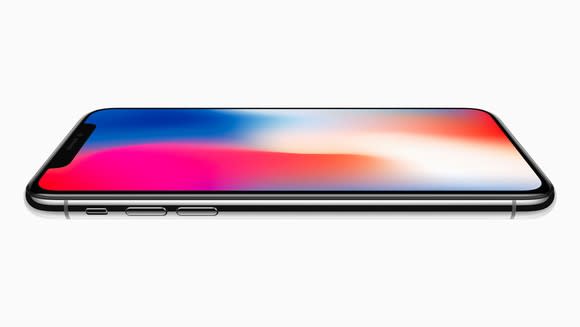Inside This Questionable Apple Inc. Rumor
Fast Company recently published a report claiming that Apple (NASDAQ: AAPL) is "leaning heavily toward" using chipmaker Intel's (NASDAQ: INTC) 5G cellular modems exclusively in a next-generation iPhone, leaving longtime Apple supplier Qualcomm (NASDAQ: QCOM) out of the mix. The report says that, while Apple's engineers have been working together to prepare for the move toward 5G networks, Apple and Qualcomm have only had what is described as "limited" discussions about future 5G modem technology.

Image source: Apple.
Given the seemingly sour relationship between Apple and Qualcomm, it's not surprising that Apple would be more interested in cementing Intel, and not Qualcomm, as its long-term cellular technology provider.
There was one tidbit in the article, however, that seemed a little bit questionable. Let's dive into it.
An Intel manufacturing deal?
Fast Company says Apple eventually wants to integrate Intel's modem technology into a future version of the former's A-series applications processors, which currently integrate many of the critical processors that the iPhone requires to function. Such a chip, Fast Company reports, would be "co-designed by Intel and Apple, and would be fabricated at an Intel facility." Fabrication, in this case, refers to the manufacture of the chip, which requires highly specialized factories and manufacturing processes.
Today, Apple's latest A-series applications processors are manufactured by Taiwan Semiconductor Manufacturing Company (NYSE: TSM), while the stand-alone cellular modems that Apple utilizes in its devices are manufactured by either TSMC or Samsung (NASDAQOTH: SSNLF).
While such an agreement would be a clear win for Intel -- as well as a clear loss for TSMC -- I'm highly skeptical that this is something that will come to fruition anytime soon for several reasons.
Compounding risks
By keeping the applications processor and cellular modems separate in today's iPhones, Apple makes a sensible engineering trade-off. One benefit of keeping these technologies separate includes lower product-development risk, as integrating the cellular baseband processor into the applications processor adds complexity and an additional point of failure. Another is the ability to buy modems from multiple sources for both pricing leverage and as insurance if one supplier fails to deliver.
The downside is that keeping these components separate means that Apple's iPhones necessarily have larger logic boards than they would in the case where Apple used an integrated applications processor and cellular baseband processor solution. For example, such larger logic boards can limit Apple's ability to include larger batteries in its devices.

Image source: Apple.
Additionally, all else being equal, an integrated solution might be more power efficient than using stand-alone chips.
In my view, Apple is making the right call in keeping these components separate, as the benefits far outweigh the risks. By forcing the integration of these technologies into a single chip, Apple would not only take on the risks inherently associated with integrating a cellular modem into the applications processor, but amplify that risk because the modem technology comes from a third party.
On top of that, it would seemingly require that Apple shift the manufacturing of its A-series applications processors to Intel's factories. Since Intel has seen limited success in trying to build chips for third parties, it's hard to imagine that Apple would be willing to bet the farm on Intel's contract chip-manufacturing business for the hearts and souls of its future iPhones.
The only way that I could see such an arrangement working is if the integration referenced by Fast Company didn't refer to integrating Intel's modems onto the same piece of silicon as the Apple A-series processor, but instead, integrating Apple's A-series applications processors alongside Intel's modems in a single package.
Such an integration scheme could afford Apple most of the benefits of the integration of the modem into the main applications processor, but with vastly reduced risk -- since the A-series processor and the modem would still be separate chips.
Foolish takeaway
It wouldn't surprise me one bit to see Apple and Intel deepen their technological collaboration in the years ahead, so I think the odds of Apple eventually sourcing its cellular modems exclusively from Intel in the near future are reasonable. What I think is far less likely is the scenario where Apple and Intel work to co-design the A-series applications processors used in future iPhones, and then build them exclusively in Intel's factories, as it would simply represent far too much risk on Apple's part.
More From The Motley Fool
6 Years Later, 6 Charts That Show How Far Apple, Inc. Has Come Since Steve Jobs' Passing
Why You're Smart to Buy Shopify Inc. (US) -- Despite Citron's Report
Ashraf Eassa owns shares of Intel and Qualcomm. The Motley Fool owns shares of and recommends Apple. The Motley Fool owns shares of Qualcomm and has the following options: long January 2020 $150 calls on Apple and short January 2020 $155 calls on Apple. The Motley Fool recommends Intel. The Motley Fool has a disclosure policy.
